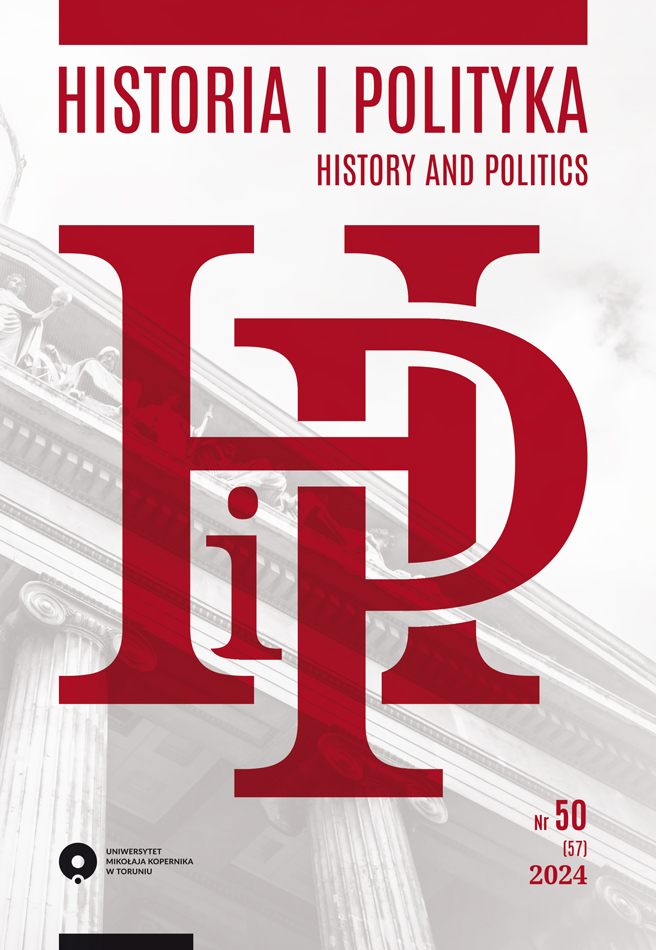Feminist Movement in Turkey in the 1990s
DOI:
https://doi.org/10.12775/HiP.2024.037Słowa kluczowe
feminism, Turkey, Women’s Issues Research CenterAbstrakt
According to a feminism worldview, women should have economic, social, civil, political, and cultural rights. For this, women need to go a long, controversial and interesting path. On the one hand, they are aware of their place in society, in the state, and on the other hand, they are trying to change the cultural norms that cause oppression.
Turkey is the only country in which the majority of the population is Muslim, and at the same time, it is a candidate for EU membership. Turkey has managed to create a progress-oriented state. This is a well-planned and calculated path with predetermined steps, paved with the reforms of the founder of the republic, Mustafa Kemal Atatürk (1881–1938).
The problem of feminism is one of the most lively topics in republican Turkey. The processes taking place in the Ottoman Empire at the end of the 19th century and at the beginning of the 20th century prepared a solid ground for further development of the feminist movement. On October 29, 1923, after Turkey was declared a republic, the feminist movement took a new direction.
The feminist movement in Turkey went through three periods. The first period includes the processes of the collapse of the Ottoman Empire and “Europeanization”, which led to the advancement of the women’s problems to the fore and the active struggle for the rights and place of educated Ottoman women in society. The second period was determined by the civil law on the participation of women in elections, adopted in republican Turkey in 1926. And the third one was the period of the 1990s, when the feminist movement became more widespread and active. Feminist policies have been founded and carried out, the role of women in government structures has increased; feminist organizations were created in Istanbul, Ankara and Antalya, etc.
In the 1990s, the movement of Muslim feminists, Islamist women, known as “Islamic feminism”, became active in Turkey. After the creation of the republic in Turkey, religious associations came under the direct subordination and control of the state. There have been prepared various projects to solve women’s problems. Centers for the study of women’s issues have been opened at universities. For the first time, women spoke openly about sexual freedom, etc.
Bibliografia
Acar, F. (2010). Türkiye'de İslamcı Hareket ve Kadın: Kadın Dergileri ve Bir Grup Üniversite Öğrencisi Üzerinde Bir İnceleme. In: Ş. Tekeli (Ed.). 1980’ler Türkiyesi’nde: Kadın Bakış Açısından Kadınlar (pp. 73–90). İstanbul: İletişim Yayınları.
Bukuri, M. (2005). Woman in the Republic of Turkey. East and Caucasus, 3.
Bukuri, M. (2012). Woman in Turkey. [Doctoral Dissertation]. Tbilisi.
Buskivadze, M. (2013). Feminism in Turkey and the Issue of Female Authors in Turkish Literature. [Doctoral Dissertation]. Tbilisi: Ivane Javakhishvili Tbilisi State University.
İngün, Ö. (2005). Feminizm ve islam ilişkisi: “Islami Feminizm”. [Doctoral Dissertation]. Bursa: Uludağ Üniversitesi.
Kandiyoti, D. (2010). Ataerkil Örüntüler: Türk Toplumunda Erkek Egemenliğinin. Çözümlenmesine Yönelik Notlar. In: Ş. Tekeli (Ed.). 1980’ler Türkiyesi’nde: Kadın Bakış Açısından Kadınlar (pp. 327–340). İstanbul: İletişim Yayınları.
Makaradze, E. (2019). History of Turkey in 1918–2018: Lecture Notes. Tbilisi.
Makaradze, E. (2021). The Role of Women in the Educational System of Turkey after WWII. Balkanistic Forum, 30(1), 227–232.
Paker, S. (1991). Unmuffled Voices in the Shade and Beyond: Women’s Writing in Turkish. In: H. Forsas-Scott (Ed.). Textual Liberation: European Feminist Writing in the Twentieth Century (pp. 270–300). London: Routledge.
Tekeli, Ş. (1986). Emergence of the Feminist Movement in Turkey. In: D. Dahlerup (Ed.). The New Women’s Movement: Feminism and Political Power in Europe and the USA (pp. 179–199). London: Sage.
Tekeli, Ş. (Ed.) (2010). 1980’ler Türkiyesi’nde Kadınlar. İstanbul: İletişim Yayınları.
Pobrania
Opublikowane
Jak cytować
Numer
Dział
Licencja
Prawa autorskie (c) 2024 Emzar Makaradze, Natela Phartenadze

Utwór dostępny jest na licencji Creative Commons Uznanie autorstwa – Bez utworów zależnych 4.0 Międzynarodowe.
Uniwersytet Mikołaja Kopernika w Toruniu respektuje prawo do prywatności i ochrony danych osobowych autorów.
Dane autorów nie są wykorzystywane w celach handlowych i marketingowych. Redaktorzy i recenzenci są zobowiązani do zachowania w poufności wszelkich informacji związanych ze złożonymi do redakcji tekstami.
Autor, zgłaszając swój tekst wyraża zgodę na wszystkie warunki i zapisy umowy licencyjnej (określającej prawa autorskie) z Uniwersytetem Mikołaja Kopernika w Toruniu.
Statystyki
Liczba wyświetleń i pobrań: 606
Liczba cytowań: 0



